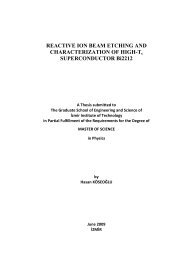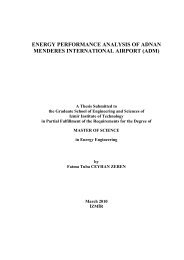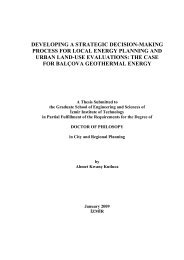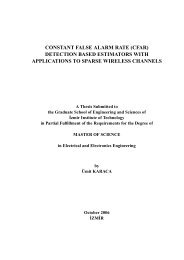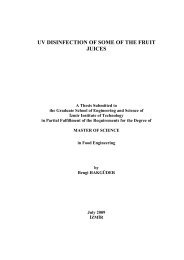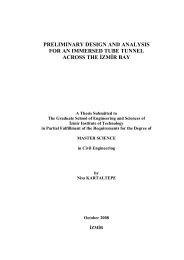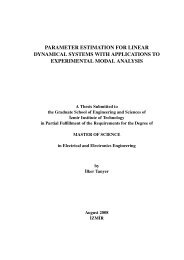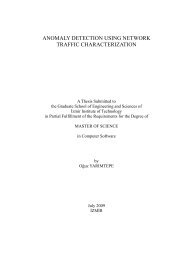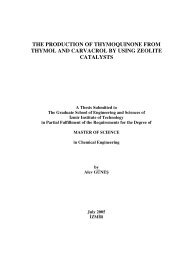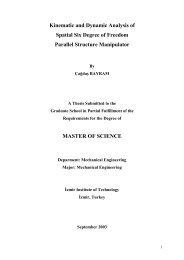a critical evaluation on the concept of justice in planning process
a critical evaluation on the concept of justice in planning process
a critical evaluation on the concept of justice in planning process
Create successful ePaper yourself
Turn your PDF publications into a flip-book with our unique Google optimized e-Paper software.
2.3. Rawls and Justice as Fairness<br />
In his <strong>the</strong>ory, Rawls aims at reach<strong>in</strong>g acceptable pr<strong>in</strong>ciples <strong>of</strong> divisi<strong>on</strong> <strong>in</strong> a<br />
society c<strong>on</strong>sist<strong>in</strong>g <strong>of</strong> <strong>in</strong>dividuals <strong>in</strong> “orig<strong>in</strong>al positi<strong>on</strong>s” <strong>of</strong> <strong>the</strong>ir own. 16 In realizati<strong>on</strong> <strong>of</strong><br />
<strong>the</strong>se pr<strong>in</strong>ciples, he dwells <strong>on</strong> <strong>the</strong> social structure, <strong>the</strong> most just c<strong>on</strong>diti<strong>on</strong>s acceptable<br />
and <strong>the</strong> just operati<strong>on</strong> <strong>of</strong> <strong>in</strong>stituti<strong>on</strong>s <strong>in</strong> analytical and procedural terms both (Hünler;<br />
1997). In order to reach <strong>the</strong> ideal pr<strong>in</strong>ciples, he first determ<strong>in</strong>es <strong>the</strong> ma<strong>in</strong> c<strong>on</strong>cepts <strong>of</strong><br />
<strong>justice</strong> <strong>the</strong>ory and <strong>the</strong>n elucidates <strong>the</strong> relati<strong>on</strong>ship between <strong>the</strong>se c<strong>on</strong>cepts. 17 In <strong>the</strong>se<br />
hypo<strong>the</strong>tically c<strong>on</strong>stituted ideal grounds, <strong>the</strong> understand<strong>in</strong>g <strong>of</strong> social benefit c<strong>on</strong>sist<strong>in</strong>g<br />
<strong>of</strong> all <strong>in</strong>dividual <strong>in</strong>terests adopted by <strong>the</strong> utilitarian approach is rejected (Rawls; 1971;<br />
3-4). C<strong>on</strong>trary to this standpo<strong>in</strong>t, Rawls suggests a framework for an orig<strong>in</strong>al positi<strong>on</strong><br />
admitt<strong>in</strong>g that social benefits are <strong>of</strong> benefit to <strong>the</strong> <strong>in</strong>dividual. In this framework, <strong>the</strong><br />
<strong>in</strong>dividuals <strong>of</strong> ideal-hypo<strong>the</strong>tical status reach an agreement via discuss<strong>in</strong>g <strong>the</strong> pr<strong>in</strong>ciples<br />
<strong>of</strong> <strong>justice</strong> <strong>in</strong> order to atta<strong>in</strong> social welfare.<br />
The essential c<strong>on</strong>cept <strong>of</strong> his <strong>the</strong>ory is: “<strong>justice</strong> as fairness”. In “<strong>justice</strong> as<br />
fairness” approach, he states that <strong>the</strong> priority subject <strong>of</strong> <strong>justice</strong> is <strong>the</strong> basic structure <strong>of</strong><br />
society, i.e., <strong>the</strong> major <strong>in</strong>stituti<strong>on</strong>s <strong>of</strong> society. In words <strong>of</strong> Rawls, this is expressed as<br />
“…<strong>the</strong> way <strong>in</strong> which <strong>the</strong> major social <strong>in</strong>stituti<strong>on</strong>s distribute fundamental rights and<br />
duties and determ<strong>in</strong>e <strong>the</strong> divisi<strong>on</strong> <strong>of</strong> advantages from social cooperati<strong>on</strong>” (Rawls;<br />
1971;7).<br />
C<strong>on</strong>cern<strong>in</strong>g <strong>the</strong> issues as to which circumstances shall a <strong>the</strong>ory <strong>of</strong> <strong>justice</strong> and<br />
just c<strong>on</strong>diti<strong>on</strong>s comprise and when <strong>in</strong><strong>justice</strong> shall become acceptable, Rawls denotes <strong>the</strong><br />
follow<strong>in</strong>g: “…A <strong>the</strong>ory however elegant and ec<strong>on</strong>omical must be rejected or revisited if<br />
it is untrue; likewise laws and <strong>in</strong>stituti<strong>on</strong>s no matter how efficient and well-arranged<br />
must be reformed or abolished if <strong>the</strong>y are unjust…<strong>justice</strong> denies that loss <strong>of</strong> freedom for<br />
some is made right by a greater good shared by o<strong>the</strong>rs…<strong>in</strong> a just society <strong>the</strong> liberties <strong>of</strong><br />
16 Rawls del<strong>in</strong>eates a start<strong>in</strong>g po<strong>in</strong>t <strong>in</strong> accept<strong>in</strong>g <strong>the</strong> percepti<strong>on</strong> <strong>of</strong> <strong>justice</strong> <strong>in</strong> <strong>the</strong> entire society.<br />
Hipo<strong>the</strong>tically, at this po<strong>in</strong>t (orig<strong>in</strong>al positi<strong>on</strong>) where nobody has any idea c<strong>on</strong>cern<strong>in</strong>g <strong>the</strong> past and<br />
relati<strong>on</strong>s <strong>of</strong> divisi<strong>on</strong>, <strong>the</strong> <strong>in</strong>dividuals are covered with a veil <strong>of</strong> ignorance. This <strong>in</strong>itial po<strong>in</strong>t is accepted as<br />
a prelim<strong>in</strong>ary situati<strong>on</strong> required for adopti<strong>on</strong> <strong>of</strong> <strong>justice</strong> pr<strong>in</strong>ciples. This framework is <strong>the</strong> <strong>on</strong>e which is<br />
used societally by <strong>in</strong>dividuals <strong>in</strong> agreement up<strong>on</strong> <strong>justice</strong> pr<strong>in</strong>ciples <strong>in</strong> order to forget <strong>the</strong> exist<strong>in</strong>g<br />
<strong>in</strong>equalities <strong>in</strong> terms <strong>of</strong> past-present-future and head towards new pr<strong>in</strong>ciples by break<strong>in</strong>g <strong>of</strong>f from <strong>the</strong><br />
historical c<strong>on</strong>text.<br />
17 As for <strong>the</strong> o<strong>the</strong>r c<strong>on</strong>cepts that are determ<strong>in</strong><strong>in</strong>g <strong>in</strong> elucidati<strong>on</strong> <strong>of</strong> this c<strong>on</strong>cept, <strong>the</strong>y cover <strong>the</strong> c<strong>on</strong>cepts <strong>of</strong><br />
orig<strong>in</strong>al positi<strong>on</strong>, veil <strong>of</strong> ignorance, <strong>in</strong>itial situati<strong>on</strong>, sense <strong>of</strong> <strong>justice</strong>, basic structure <strong>of</strong> society, reflective<br />
equilibrium, social c<strong>on</strong>tract, th<strong>in</strong> good <strong>the</strong>ory, full good <strong>the</strong>ory, and procedural <strong>justice</strong>.<br />
26



